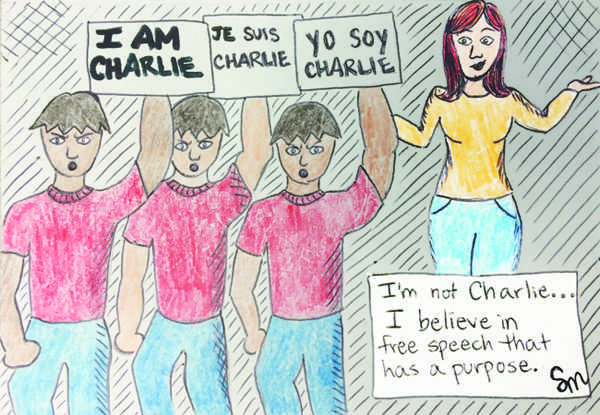Free speech needs a purpose
They did not deserve to die. I do not believe that death is a just punishment for anyone, especially journalists who were practicing their right to freedom of speech. On Jan. 7, the tragedy at Charlie Hebdo downtown offices in Paris was the largest terrorist attack to occur in France in the past 50 years.
Death is not a just punishment for anyone, including the terrorists that were responsible for the attack on Charlie Hebdo journalists. Their crime was horribly wrong, but there are worse punishments than death, such as life imprisonment. The death penalty is outlawed in France anyway, so it is probable that the criminals will spend the rest of their lives in jail.
There is no excuse for what the terrorists did, but I am not going to pretend that the Charlie Hebdo journalists were saints who died and should now be worshiped as martyrs.
Charlie Hebdo is a French satirical magazine that indiscriminately pokes fun at all demographics and institutions. The way Charlie Hebdo uses its freedom of speech is not brave and admirable. Instead, they hide under the veil of sarcasm and ridicule, cynical about everything and supporting nothing except irreverence.
I concede that satire is an important part of a democracy. Being disrespecful to authority and dishonoring custom is a natural part of independent thought. Thinking that Charlie Hebdo cartoons might provide some insight into French society, I used my modest knowledge of the language to read a few on google.
I could not scroll down more than a few rows before being utterly disgusted. I asked myself, “Who actually wants to read this stuff?”
The cartoons I saw were vulgar, mainly depicting images of sleazy politicians, potty humor and perverted variations of sexual intercourse.
On the front cover of the publication, Charlie Hebdo even describes itself with the epithet “Journal Irresponsable,” or “Irresponsible Newspaper.” Anyone else who glances at their inappropriate cartoons would not disagree with this description.
In what is considered their most famous cartoon ever, the irresponsible newspaper depicted the Islamic prophet Muhammad embracing and kissing a male Charlie Hebdo artist.
Personally, I found this image hard to look at. For one thing, in the Islamic religion it is incredibly taboo to depict the prophet Muhammad in any form. Additionally, religious groups have a history of persecuting homosexuals, and because of this, certain strict adherents to Islam would be mortified that in addition to Muhammad’s image being depicted, it was depicted kissing a man.
I am not a Muslim, but I am a Christian and I can understand how offensive this image would be. I have never been homophobic, but if I saw Jesus being depicted amorously kissing anyone, boy or girl, I would definitely take offense.
Similar to the Islamic rule against depicting their prophet, many Presbyterian churches refrain from depicting Jesus in the sanctuary because it is believed that doing so could lead to the worship of images, or idols, and detract from the worship of God.
That just goes to show that there are parallels between faiths. Something I might view as strange, such as prohibiting the image of a prophet, is not actually that far removed from something in my own culture.
There are similarities between religions, but the “Islamic” extremists who were involved in the attack on Charlie Hebdo should not even be considered representatives of Islam. They are simply terrorists, common criminals who went on a killing rampage because their feelings were hurt.
We even have “Christian” extremists in our own country, such as the Westboro Baptist Church. They call themselves Christian, but they are widely seen as a hate group.
They pretty much hate any demographic that does not fall under the category of WASP (White Anglo-Saxon Protestant). They openly discriminate and protest against homosexuals, jews and Catholics. They even believe that Obama is the anti-christ and that he forms an unholy trinity with Satan and the Pope.
So what if the rest of the world began to think that all Christians were as demented as the extremists of the Westboro Baptist Church? As a Christian, I would feel ostracized whenever I walked down the street. I would hate to show my face in public for fear of being misunderstood by popular stereotypes.
I am sure that this is how normal, law-abiding Muslims feel when the media portrays all members of their religion as angry, blood-thirsty terrorists. It is simply unfair to the rest of Islam when extremists cause tragedies and negatively color public perceptions of Muslims, just like with the Charlie Hebdo shootings.
In the days since the attack, global protesters have taken to the streets toting signs that read “Je suis Charlie,” translating to “I am Charlie,” in protest of the tragedy that befell Charlie Hebdo magazine.
Though I strongly disapprove of the actions of these terrorists, I could never identify with the Charlie Hebdo journalists and the magazine they died for. They were known for their rude, perverse and often offensive commentary, and I could never claim to be that kind of person.
So when I see images of protesters claiming to “be Charlie,” I wonder — are those people actually supporting being rude and racist? Because let’s face it, if Charlie Hebdo were a person, he would be the kind that no one likes: vulgar, rude and always putting other people down.
Basically, I am just trying to say people’s faiths deserve a degree of respect. Everyone has certain rights, including freedom of religion and freedom of speech. All religions, regardless of whether you believe in them or not, should be treated with tolerance. Publications of the free press should be treated with tolerance as well. Charlie Hebdo was far from tolerant of Islam, and their inflammatory caricatures of Muhammad provoked an attack.
If Charlie Hebdo had been contributing something constructive to society, I might feel differently. They have every right to continue expressing themselves, but I sincerely hope that they will stop being an “irresponsible newspaper” that puts their employees in danger just for a few cheap laughs.

Sarah Metzel is the current Editorals Editor of The A-Blast. She joined the staff sophomore year as a staff writer.
Metzel was accepted into the Young...









